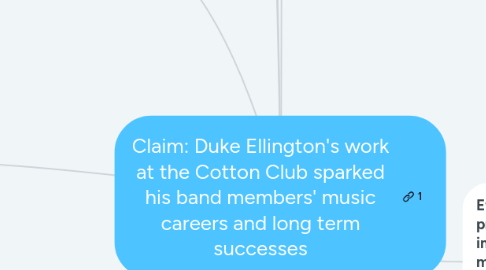
1. Evidence: Duke Ellington slowly stops incorporating jungle styles and changes his musical style to please the white audience/entertainment after he left the Cotton Club.
1.1. Supporting evidence, Explanation/Thoughts: This proves my claim because Ellington switches up his style after he stopped working at the club to show change in styles and shift his public image to have various artistic styles, because he knows what styles to target to capture success.
1.2. Hannon Teal, Kimberley. “Beyond the Cotton Club: The Persistence of Duke Ellington’s Jungle Style.” Jazz Perspectives, vol. 6, no. 1/2, Aug. 2012, pp. 123–149. EBSCOhost, doi:10.1080/17494060.2012.721292.
2. Evidence: Throughout Duke Ellington's lifetime, he learnt techniques of logos, pathos, and ethos. He uses these techniques in his music to spread messages to a large amount of audience, and gained a lot of attention.
2.1. Supporting evidence, Explanation/Thoughts: This proves my claim because Ellington, as an evangelical egalitarian, was able to use the art of persuasion to inspire egalitarians to pursue equality, and many people decided to follow him.
2.1.1. Ellington shows pathos by his love for music, adoration for his audience, and encouragement to other musicians.
2.1.2. Ellington shows ethos as he is already a composer, band leader, pianist, and orator who deliberately speaks and use inclusive language.
2.1.2.1. GROOTHUIS, DOUGLAS. “Duke Ellington and Biblical Equality.” Priscilla Papers, vol. 28, no. 2, Spring 2014, pp. 25–28. EBSCOhost, search.ebscohost.com/login.aspx?direct=true&db=a9h&AN=96292702&site=ehost-live.
2.1.3. Ellington shows logos through presence and being. Ellington and his band indirectly showed how they were also human beings who should be respected.
3. Evidence: The rhetoric of genuine personality that Duke Ellington has gained throughout his career led to respect for African Americans in American life.
3.1. Supporting evidence, Explanation/Thoughts: This supports my claim because people begin to respect and support him after seeing the struggles he went through while making music. Ellington endured both rejection and segregation while he performed and did not refuse to play his music even if him and his band had to endure discrimination.
3.1.1. GROOTHUIS, DOUGLAS. “Duke Ellington and Biblical Equality.” Priscilla Papers, vol. 28, no. 2, Spring 2014, pp. 25–28. EBSCOhost, search.ebscohost.com/login.aspx?direct=true&db=a9h&AN=96292702&site=ehost-live.
3.1.2. He did this by using the art of persuasion to inspire egalitarians to pursue equality.
3.1.3. He had a refinement which gained recognition and widespread popularity within both black and white audiences.
4. Evidence: Duke Ellington's work in the Cotton Club helped elevate the Harlem Renaissance because his music became one of the most major role in popularizing jazz music in Harlem with his live performances at the Cotton Club.
4.1. Supporting evidence, Explanation/Thoughts: This proves my claim because Duke Ellington has dealt and with all humiliation, obstruction, and success throughout his career. Duke is experienced in the hate and slander he receives from being a vocal egalitarian.
4.1.1. GROOTHUIS, DOUGLAS. “Duke Ellington and Biblical Equality.” Priscilla Papers, vol. 28, no. 2, Spring 2014, pp. 25–28. EBSCOhost, search.ebscohost.com/login.aspx?direct=true&db=a9h&AN=96292702&site=ehost-live.
4.2. Supporting evidence, Explanation/Thoughts: This proves my claim because Ellington created a sense of increased recognition and involvement in various cultural movements.
5. Evidence: Ellington composes Jungle and African themed pieces when he was working in the Cotton Club.
5.1. Supporting evidence, Explanation/Thoughts: This proves my claim because started to focus on other styles to gain attention and boost his career. Ellington had a jungle-style when he was temporarily working in the Cotton Club however, once he left the club, he began to shift away from that style.
5.1.1. Every now and then, Ellington would compose jungle style themes to appeal to black audiences.
